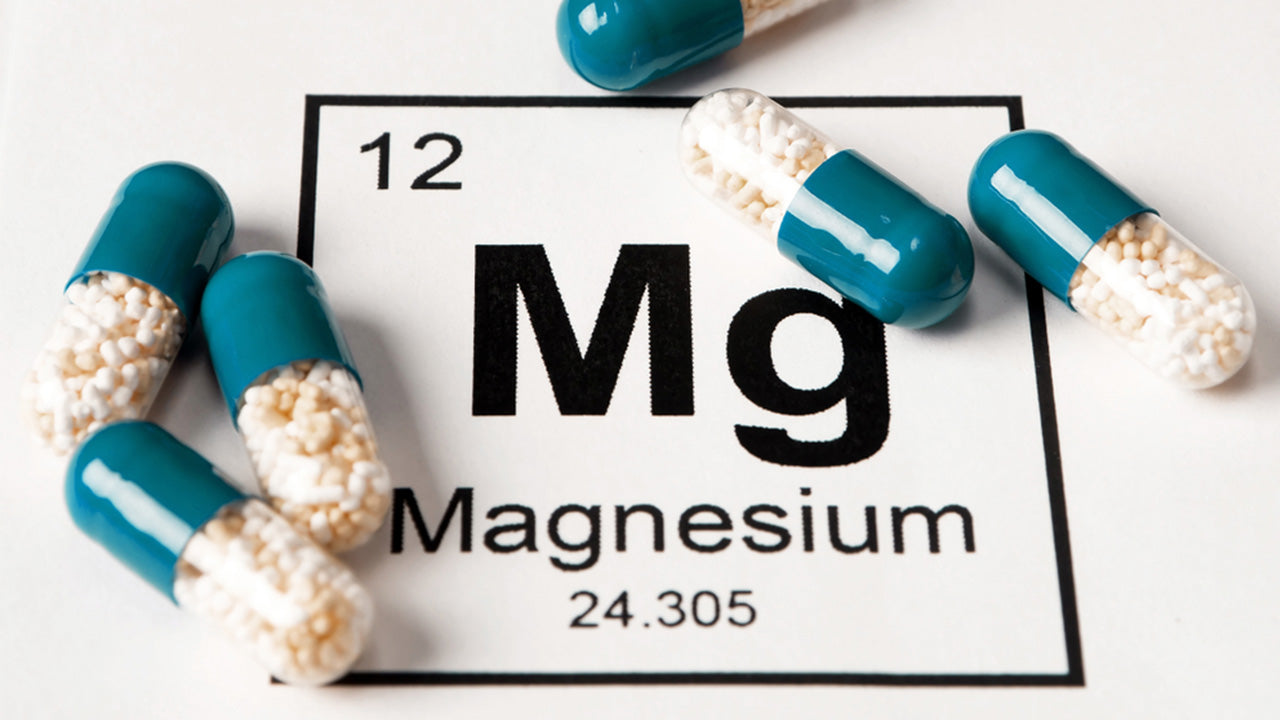The Uses and Benefits of Magnesium Malate
 By: by Amino Science
By: by Amino Science

Magnesium malate is a form of magnesium that's highly absorbable by human beings. It provides not only the benefits of magnesium, but also the benefits of malic acid. Malic acid is a nutrient that contributes to our energy production by turning food into ATP (adenosine triphosphate), the molecule that carries energy within our cells. That's only the beginning of all that magnesium malate can do—read on to discover the scientifically backed benefits that magnesium malate can bring you.

The Top Magnesium Malate Benefits
Magnesium is needed for cell formation and for maintaining your nerves, bones, and muscles. Most people can get the magnesium they need from their diet because it's found in foods as diverse as whole grains, nuts, seeds, tofu, avocados, bananas, and dark chocolate. However, some people need to supplement magnesium to make sure they're getting enough of this essential nutrient, and that is where magnesium malate comes in.
Because elemental magnesium is difficult for the body to absorb on its own, many supplements will bind magnesium to a salt for better absorption. Magnesium malate is one of those salt combinations, formed when magnesium is combined with malic acid.
Malic acid by itself is often taken by those seeking to improve their muscle performance, boost their mental focus, and reduce post-exercise fatigue. All those uses in one supplement means that this particular magnesium formation can help benefit those with conditions such as chronic fatigue syndrome and fibromyalgia. Read on to find out what else magnesium malate can do.
Magnesium Malate for Sleep
Without enough magnesium, the hormone melatonin cannot function properly. Melatonin is responsible for sleep regulation, and without it you may find it difficult to fall asleep and stay asleep peacefully. Magnesium malate may help your sleep process, as magnesium is known to play a role in normal sleep regulation.
Magnesium Malate for Anxiety
Magnesium is important for stabilizing the nervous system, which is what allows us to withstand stress. A deficiency in magnesium can lead to heightened levels of stress, fatigue, and anxiety. Though more scientific research needs to be done to refine the understanding of magnesium's effect on anxiety, it's generally assumed that magnesium increases the neurotransmitters that block stress, like norepinephrine, while decreasing the ones that cause stress, like adrenaline and cortisol. Studies suggest that magnesium may be an effective treatment of anxiety due to its stress-stopping abilities.
Magnesium Malate for Constipation
Magnesium helps stimulate intestinal peristalsis (involuntary muscle contractions that move food through the digestive system) and helps soften stool by gathering water to the intestinal tract. These actions not only serve to prevent and treat constipation, but they also aid the body in performing its own natural detoxification processes.
Magnesium Malate for Bone Integrity
Magnesium is needed for building bone tissue and for improving the body's absorption of calcium. This leads to magnesium playing an important role in maintaining bone density and preventing osteoporosis.
Magnesium Malate for Women's Reproductive Health
The female reproductive system needs magnesium, and a review of the scientific literature shows that magnesium supplementation is effective in the prevention of premenstrual syndrome, dysmenorrhea, and menstrual migraines. Women with the proper level of magnesium may find their menstrual cycles more manageable, while pregnant women will find magnesium supplementation even more vital because they are more vulnerable to magnesium deficiency. Since magnesium is a mineral needed for fetal development, protein synthesis, and tissue construction, magnesium supplementation is often a part of a woman's prenatal care.
Magnesium Malate for Improved Energy Production
Both magnesium and malate are needed to produce energy at the cellular level. Without enough magnesium, our mitochondria struggle to produce energy, while malate helps speed up energy production. With the high bioavailability of magnesium malate, you can put both of these compounds to work quickly to help balance your energy production.
One review on treatments for chronic fatigue syndrome and fibromyalgia suggests that magnesium malate can help manage the symptoms, including the lack of energy that characterizes both conditions. ATP levels are low in patients with chronic fatigue and fibromyalgia, and it's been suggested that magnesium malate may help boost energy and relieve tenderness and pain.
Magnesium Malate for Anti-Inflammatory Use
Magnesium is needed to maintain your calcium levels, and research suggests that too-high levels of calcium in the body cause inflammation. A magnesium deficiency is associated with chronic inflammation and may be a risk factor for conditions like arthritis and fibromyalgia.
Magnesium Malate for Muscle Development
Magnesium is used in synthesizing growth factors that influence the development of our muscle fibers. Magnesium has been found to help athletic performance and improve athletes' strength. You can boost athletic performance further with an energy-enhancing essential amino acid supplement that helps to promote the development of lean muscle mass. Learn more!
Magnesium Malate for Depression
Due to magnesium's role in synthesizing the hormones dopamine and serotonin, there is believed to be a link between magnesium deficiency and depression. One study with 126 adults found that magnesium supplementation was helpful in resolving mild-to-moderate depression after just 2 weeks. Though magnesium deficiency is not the only cause of depression, it could be a contributing factor that a magnesium supplement can help eliminate.
Magnesium Malate for Heart Health
If we don't have enough magnesium, the electrical impulses of our hearts and the regeneration of our veins and arteries can be compromised. Magnesium deficiency is inversely associated with coronary artery calcification, and research suggests that supplementing with magnesium helps prevent heart disease, endothelial dysfunction, platelet aggregation, vascular calcification (stiffening of the arteries), and atherosclerosis. Many studies show that that the proper amount of magnesium results in a 30% lower risk of cardiovascular disease.
Magnesium Malate for Blood Pressure
Magnesium causes the walls of the blood vessels to relax, and in clinical trials it helps to lower blood pressure and treat hypertension. Patients with hypertension are found to have low levels of bodily magnesium, and some research suggests that magnesium supplementation may help increase the effectiveness of antihypertensive drugs (just be sure to consult a health care professional before making any changes that may alter the effect of prescribed medication).
Magnesium Malate for Controlling Blood Sugar and Preventing Diabetes
Magnesium plays a critical role in the metabolism of sugar in our bodies. Magnesium deficiency is associated not only with erratic blood sugar levels, but also with diabetes, insulin resistance, and metabolic syndrome. Supplementation with magnesium can help control blood sugar levels and improve cholesterol ratios, and magnesium malate specifically (if made from L-malic acid) can help remove compounds that inhibit sugar breakdown and glycolysis.
Magnesium Malate vs. Citrate
Magnesium citrate is another magnesium preparation in salt form. It also increases water in the intestines and is often used as a laxative for the treatment of constipation. However, magnesium citrate has a far lower bioavailability rate than magnesium malate has, meaning you get more magnesium from the malate version.
Magnesium Malate vs. Glycinate
Much like magnesium citrate, magnesium glycinate also has lower bioavailability than magnesium malate. Glycinate is the salt form of glycine, which like aspartate or aspartame, activates our NMDA (N-methyl-D-aspartate) receptors. The NMDA receptors on our neurons help control our perception of pain, and when they're overstimulated it can lead to severe pain, as with the NMDA receptors in the guts of those with colitis. This means that too much magnesium glycinate may actually be detrimental.
Magnesium Malate Dosage
Magnesium malate supplements are often taken orally alongside a meal. The National Institutes of Health give the following recommendations for the appropriate dosage per serving size.
For women:
- 19-30 years: 310 milligrams
- 31-up: 320 milligrams
For men:
- 19-39 years: 400 milligrams
- 31-up: 420 milligrams
Dosages of malic acid generally range from 1,200-2,800 milligrams per day. People who are athletes, pregnant, breastfeeding, diabetic, or under high levels of stress may require more magnesium and should consult with their doctor to determine the optimal dosage.
Magnificent Magnesium
When looking for magnesium from a dietary supplement, you'll want to make sure you have the best bioavailable form of magnesium, and magnesium malate may be exactly the form you need. You'll want to keep the tablets in a cool, dry place, out of reach of children, but other than those precautions, you can easily add it your regimen of multivitamins and gain its amazing health benefits.

Up to 25% off Amino
Shop NowTAGS: supplements
Join the Community
Comments (0)
Most Craveable Recipes




 833-264-6620
833-264-6620



















